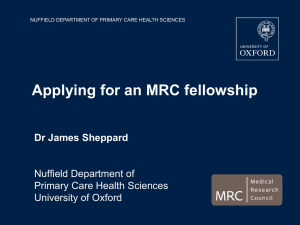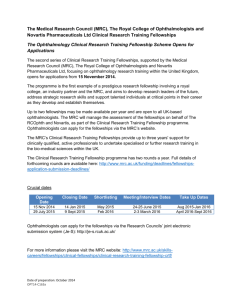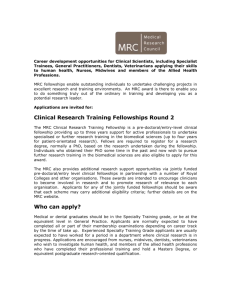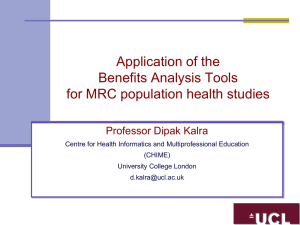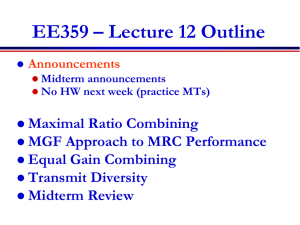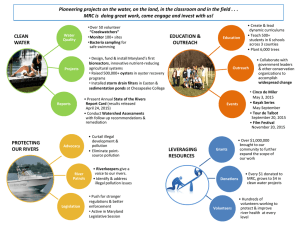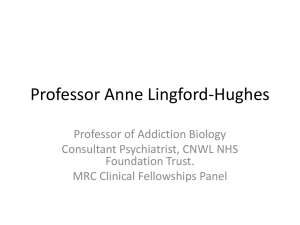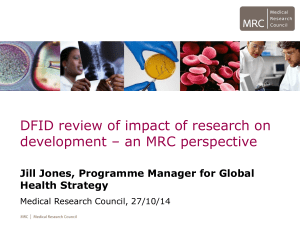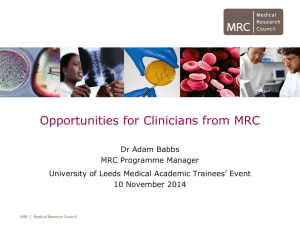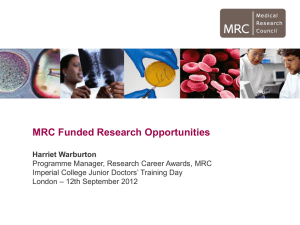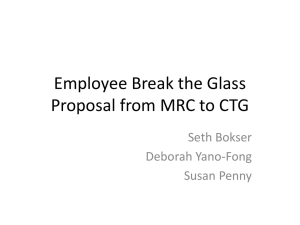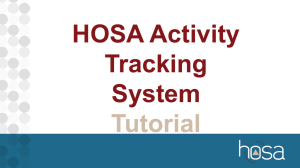Opportunities for Clinicians
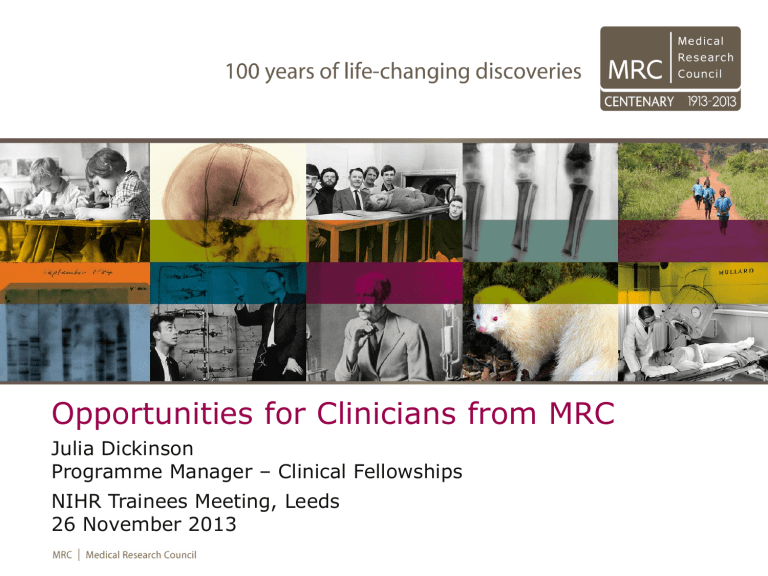
Opportunities for Clinicians from MRC
Julia Dickinson
Programme Manager – Clinical Fellowships
NIHR Trainees Meeting, Leeds
26 November 2013
Content
• About the MRC
• Mission, Strategy and Remit
• MRC funding relevant to you
• Clinical Fellowships & NIRGs
• Application Process and Tips
Leading & partnering research
Dedicated to improving human health through the best scientific research.
• Established 1913
• Funded by UK taxpayers
• One of seven Research Councils
MRC mission
• Encourage and support high-quality research with the aim of improving human health .
• Produce skilled researchers.
• Advance and disseminate knowledge and technology to improve the quality of life and economic competitiveness in the UK and worldwide.
• Promote dialogue with the public about medical research.
MRC remit and partners
• MRC: basic research to early clinical trials
• Underpinning and aetiological
• Prevention
• Detection and diagnosis
• Treatment development & evaluation
• Phase 1 & 2 trials
• Other funders/partners
• Government departments, especially Health
• Other Research Councils
• Medical Charities
• Industry
• Technology Strategy Board
Basic research
BBSRC
Discovery Preclinical
Early
Clinical
Late
Clinical
MRC
HTA
NIHR
Medical Charities
TSB
Content
• About the MRC
• Mission, Strategy and Remit
• MRC funding relevant to you
• Clinical Fellowships & Research Grants
• Application and Peer Review Process
MRC Research Fellows
Great opportunities
Outstanding researchers
Fellowships
• The person
• The project
• The ‘place’
Grants
• The project / programme
• The people
• The ‘place (s)’
“
The thing I enjoy so much is that my work has direct application to people
…”
MRC/Academy of Medical Sciences Clinician
Scientist
Fellowships: More than just a grant!
Great opportunities
• Resources
• Protected time
• Connections, networks
• Potential to establish competitive position
Outstanding researchers
• Route to independence
• Recognition
• Influence
“My fellowship led directly to more opportunities and collaborations…”
MRC Clinician Scientist Fellow
MRC Fellowships
Non Clinical, Clinical and Strategic Skills fellowships
Clinical Fellowships
Senior Research
Fellowships
For outstanding clinical researchers to establish themselves as leading investigators in clinical academic medicine.
Considered three times a year.
Intermediate
Clinical Fellowship
Postdoctoral Research
Training Fellowship
For Clinicians
For clinicians to continue research at a postdoctoral level and develop towards independence.
Considered twice a year.
Starter Grants for
Clinical Lecturers
For clinicians who have recently gained a higher degree to undertake a postdoc that will help them address a longer term research vision. Or for individuals who undertook a PhD early in their career (eg, through an MB/PhD Programme) who wish to regain momentum..
Considered three times a year.
Research Training
Fellowship
For medical, dental, clinical psychology and veterinary graduates with little/no research experience, to pursue training in a research lab towards a PhD.
Considered three times a year.
MRC has a leading role and complementary partnerships in clinical research training
Research Grants
• Support : flexible, for high quality investigator-initiated research
• Eligibility : UK Universities or NHS Trusts
• Duration : Up to 5 years - depends on the needs of the research being supported
• Funding : no pre-set limits – subject to peer review of ‘value for money’
• New Investigator Research Grants (NIRGs): clinical and nonclinical researchers in their first steps towards establishing themselves as independent principal investigators.
– 3-10 year post doc (1 year for clinicians)
– Minimum 10hr/week
– potential source of research funding for fellows whose awards only cover a personal salary
Content
• About the MRC
• Mission, Strategy and Remit
• MRC funding relevant to you
• Clinical Fellowships & NIRGs
• Application Process and Tips
Assessment of Fellowships
The Process:
Peer Review
Shortlisting
Panel Interview
Two-stage Review Process
• Referee Assessment
• Detailed evaluation of candidate potential, scientific quality and level of resourcing
• Inform short-listing decisions and interviews/funding decision
• Panel Assessment
• Short-listing decisions based on referees’ assessment
• Interview candidates to make funding decisions
Understand how peer review works
3 per 3-yr
Proposal
External referees
Reports & scores
Shortlisting
National Institutes of Health (NIH) http://www.youtube.com/watch
?v=fBDxI6l4dOA
By
Committee subgroup
Committee scores & ranks
Committee feedback
Learn from your mentors, peers & funders how peer review works
16
The Interview
• Normally 25-30 minutes
• All the Panel may be present
• 2 members will lead the questions
• Keep presentations to time
• Keep answers to the point
• Be prepared to discuss the referees’ comments
• Science-based questions, not competencies
• Practice!
Writing fellowship & grant proposals
Excite & don’t annoy your reviewers
1. Don’t be boring (“So what?”)
2. Be ambitious, original and credible
3. Structure a clear, logical plan to achieve challenging objectives
4. Explain pilot data & others’ inputs
5. Risks are inevitable: Have a Plan B
6. Write clearly, for experts & nonexperts in your field. Make your proposal easy to read!
7. Invite tough criticism from peers, mentors & friends before you submit
Remember…
Your application will only be as strong as its weakest link
Need & Potential for Impact
Design
Deliverability
Ethics
Resources
Sources of advice …
• Funder
• Website, helpline
• Named contact
• University Grants office
• University requirements
• Costing software
• Assistance in preparing grant applications
• Writing workshops
• Helpdesk
• Experienced colleagues and collaborators
• Past evaluation committee members
• Successful grant applicants
20
More information
www.mrc.ac.uk
Julia.Dickinson@headoffice.mrc.ac.uk
www.wellcome.ac.uk
John Williams: Head of Clinical Activities, j.williams@wellcome.ac.uk
James Harden: Clinical Activities Manager, j.harden@wellcome.ac.uk
Kathryn Adcock: Senior Portfolio Developer, Clinical Activities, k.adcock@wellcome.ac.uk
